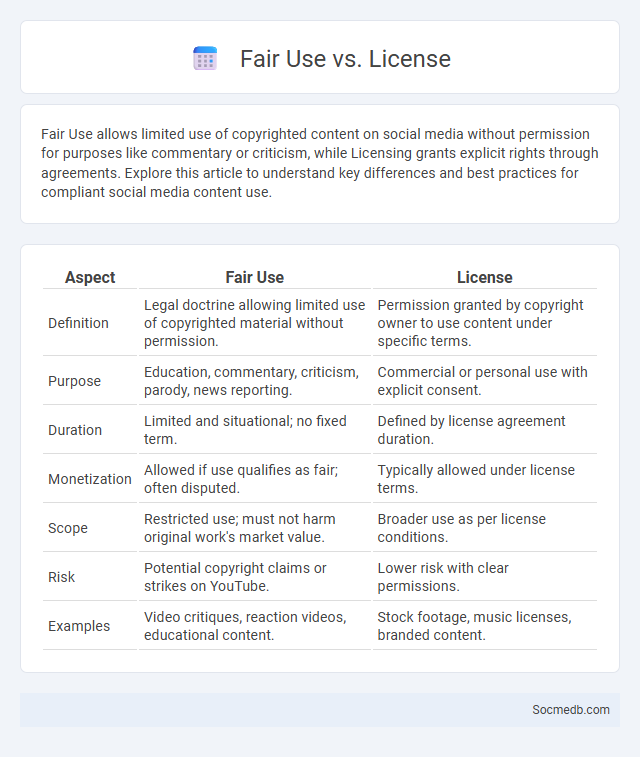
Photo illustration: Fair Use vs License
Fair Use allows limited use of copyrighted content on social media without permission for purposes like commentary or criticism, while Licensing grants explicit rights through agreements. Explore this article to understand key differences and best practices for compliant social media content use.
Table of Comparison
| Aspect | Fair Use | License |
|---|---|---|
| Definition | Legal doctrine allowing limited use of copyrighted material without permission. | Permission granted by copyright owner to use content under specific terms. |
| Purpose | Education, commentary, criticism, parody, news reporting. | Commercial or personal use with explicit consent. |
| Duration | Limited and situational; no fixed term. | Defined by license agreement duration. |
| Monetization | Allowed if use qualifies as fair; often disputed. | Typically allowed under license terms. |
| Scope | Restricted use; must not harm original work's market value. | Broader use as per license conditions. |
| Risk | Potential copyright claims or strikes on YouTube. | Lower risk with clear permissions. |
| Examples | Video critiques, reaction videos, educational content. | Stock footage, music licenses, branded content. |
Understanding Fair Use: Definition and Principles
Fair use is a legal doctrine allowing limited use of copyrighted material without permission for purposes such as commentary, criticism, news reporting, education, or research. Key principles include purpose and character of use, nature of the copyrighted work, amount used, and effect on the market value of the original. Social media users must carefully analyze these factors to ensure their content falls within fair use boundaries and to avoid copyright infringement.
What is a Copyright License?
A copyright license grants You legal permission to use, reproduce, or distribute copyrighted content on social media platforms. It outlines specific terms, such as duration, scope, and limitations, protecting both the content creator's rights and Your responsibilities. Understanding these licenses ensures compliance and avoids copyright infringement penalties.
Key Differences: Fair Use vs License
Understanding the key differences between fair use and licensing in social media is crucial for content creators and users. Fair use allows limited use of copyrighted material without permission for purposes like commentary, criticism, or education, typically evaluated by factors such as purpose, nature, amount, and market effect. Your ability to legally use content often hinges on whether your use qualifies under fair use or requires obtaining a license to avoid infringement claims.
Legal Foundations of Fair Use
Fair use is a critical legal foundation protecting your ability to share and remix content on social media without explicit permission, provided the use is transformative, non-commercial, and limited in scope. Key factors include the purpose of use, the nature of the copyrighted work, the amount used, and the effect on the market value of the original. Understanding these elements helps you avoid infringement while engaging creatively within social media platforms.
Types of Licenses in Copyright Law
Social media platforms host a variety of user-generated content, each subject to different types of licenses under copyright law, such as exclusive licenses granting specific rights to a single entity and non-exclusive licenses allowing multiple users to utilize the work. Creative Commons licenses are commonly applied to social media posts, enabling users to specify permissions for sharing, adapting, or commercial use while maintaining the original author's rights. Understanding these licenses helps both content creators and users navigate permissions, protect intellectual property, and avoid infringement issues on platforms like Instagram, Facebook, and YouTube.
When Does Fair Use Apply?
Fair use applies on social media when your content transforms original material for commentary, criticism, or educational purposes without negatively impacting the market value of the original work. Factors such as the purpose, nature, amount, and effect on the market determine whether your use qualifies as fair use. Understanding these criteria helps you navigate copyright issues and protect your rights while sharing content responsibly.
Limitations of Fair Use
Fair use limitations on social media restrict the unauthorized use of copyrighted content, often leading to content removal or demonetization. Platforms enforce strict algorithms to detect copyright infringement, impacting creators' freedom to share and remix content. These restrictions pose challenges for educational, commentary, and parody content, often requiring permission or licensing to avoid penalties.
Benefits and Risks of Licensing
Social media licensing enables businesses to legally use user-generated content, enhancing brand authenticity and engagement by showcasing real customer experiences. However, licensing carries risks such as copyright infringement, potential misuse of personal data, and compliance challenges with platform policies. Careful management of licensing agreements ensures protection against legal disputes while maximizing the value of social media campaigns.
Practical Examples: Fair Use vs Licensed Content
Understanding the distinction between fair use and licensed content is crucial for managing your social media presence effectively. Fair use allows limited use of copyrighted material for purposes such as commentary, criticism, or educational content without permission, but it requires careful consideration of the purpose, nature, amount, and effect on the market value of the original work. Licensed content, on the other hand, involves obtaining explicit permission or purchasing rights to use copyrighted material, ensuring your posts avoid legal risks while maximizing engagement and authenticity.
Choosing the Right Approach: Fair Use or License?
Choosing between fair use and obtaining a license for social media content depends on the specific context and legal considerations surrounding copyrighted material. Fair use allows limited use without permission for purposes like commentary, criticism, or education, but its application is nuanced and must meet criteria such as purpose, nature, amount used, and effect on the market. Securing a license ensures legal protection and access to high-quality content, making it the safer option for businesses aiming to avoid copyright infringement on social media platforms.
 socmedb.com
socmedb.com